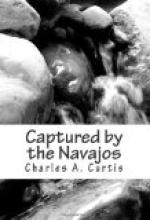At the end of the boys’ story, Brenda asked: “The thieves were a Mexican and an American?”
“Yes.”
“The American had a scar on the bridge of his nose, and the Mexican had lost his front teeth?”
“Exactly. What do you know about them, Brenda?”
“They were here, but I did not see their ponies nearer than the stable; they were black and cream color. The Mexican traded saddles with uncle. You’ll find the one he left in the lean-to, on a peg beside the door.”
Both boys leaped to the ground and ran round the house to the lean-to, and presently returned with Henry’s neat McClellan saddle. It had been stripped of its pouches and small straps, but was otherwise unharmed.
“Well, when I come back with Chiquita, Mr. Arnold, I’d like to trade saddles.”
“All right, youngkett, I’ll trade, or you can take it now, and welcome,” replied the ranchman.
“No; I’ll leave it until I return.”
The saddle was taken back to the lean-to, and after a few more words of leave-taking we started up the valley. A few miles of rapid travelling brought us to a steep ascent into a mountainous range to the right. We had proceeded but a short distance through a narrow and rugged roadway when we were overtaken by the military expressman whom we had left at Fort Whipple. He had come from Prescott to Skull Valley by a short cut.
“I have a letter for you, lieutenant,” said he, approaching the ambulance.
Unfastening the mail-pouch, he turned its contents upon the back seat. A heap of loose letters and three well-worn books strewed themselves over the cushion. Frank picked up the books and examined their titles.
“Xenophon’s Memorabilia, Euripides’ Alcestis and Medea, and a Greek grammar!” exclaimed the astonished youngster. “What are you doing with these college text-books on the La Paz trail?”
“Making up conditions,” replied the courier, a blush deepening the brown of his face.
“What are conditions?” asked Henry.
“Oh, blissful ignorance! Why was I not spared the task of enlightening it?” answered the courier. “Conditions are stumbling-blocks placed in the way of successful trackmen, football players, and rowing men by non-appreciative and envious professors.”
“‘Joseph Gould Hudson, University of Yalvard,’” read Frank from the fly-leaf of the Memorabilia. “Is that your name, Mr. Hudson?”
“I’m so borne on the Yalvard catalogue.”
“Please explain, Mr. Hudson,” I said, “how a college boy happens to be in Arizona running the gantlet of this mail-route and making up conditions in Greek?”
“I was stroke in the crew that won the championship for Yalvard at New London one year ago, and got behind in these. I was conditioned, and being ashamed to face an angry father, struck out for myself on the Pacific coast. I drifted about from mining-camp to cattle-range until I was dead broke; this place offered, and I took it because I could find nothing else. I’ve had lots of opportunities for reflection on the Xuacaxella. I’m the repentant prodigal going home to his father.”




